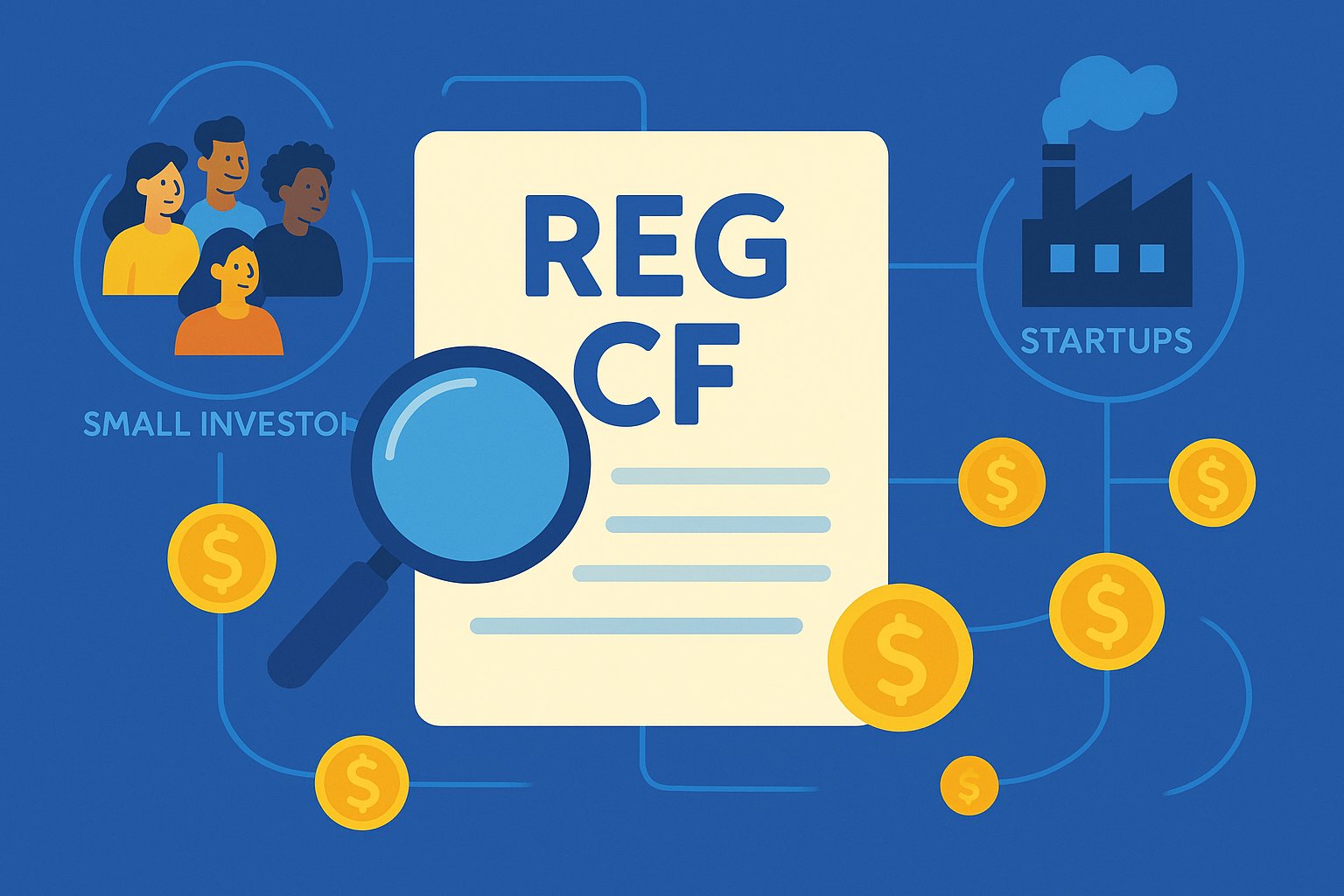Democratizing Investment Opportunities
In an era where innovation springs from small teams and grassroots initiatives, accessing capital has traditionally favored established players and well-connected networks. Regulation Crowdfunding (commonly known as Reg CF) changed the game by opening the doors of securities-based financing to everyday investors and burgeoning entrepreneurs alike. Launched under Title III of the Jumpstart Our Business Startups (JOBS) Act in 2016, Reg CF empowers startups and small businesses to raise capital online by offering securities—equity, debt, or revenue-based instruments—to both accredited and non-accredited investors. Unlike traditional venture funding, which requires significant minimum investments and often involves complex negotiations, Reg CF campaigns can begin with as little as a few hundred dollars per contributor, transforming backers into active stakeholders.
This groundbreaking rule set establishes a framework in which innovative ideas can find the funding they need without shouldering the heavy compliance burden of a full public offering. By leveraging the reach of Internet platforms, Reg CF not only broadens access to capital but also fosters a deeper connection between businesses and their communities. Entrepreneurs gain a captive audience of engaged supporters, while investors secure the chance to participate in early-stage ventures previously reserved for venture capitalists and high-net-worth individuals. As the crowdfunding ecosystem matures, understanding the intricacies of Reg CF becomes essential for anyone seeking to launch a compliant campaign or explore alternative investment channels. In this comprehensive guide, we look into the origins of Regulation Crowdfunding, explain how it works in practice, and unpack the roles and responsibilities of issuers, investors, and intermediaries. We explore eligibility criteria, investor protections, compliance requirements, and the evolving impact of Reg CF on the broader financial landscape. Whether you are a founder plotting your first capital raise or an investor exploring new asset classes, this article will equip you with the knowledge needed to navigate Reg CF’s transformative potential.
The Genesis of Regulation Crowdfunding
The landscape of securities regulation underwent a seismic shift in 2012 when President Obama signed the JOBS Act into law. A flagship provision—Title III—mandated the Securities and Exchange Commission (SEC) to craft rules enabling online crowdfunding of securities. By May 2016, Reg CF emerged as the formalized mechanism through which small businesses could tap a wide investor base without the expense and complexity of an initial public offering (IPO). Before Reg CF, entrepreneurs faced prohibitive costs to file a registered offering, and non-accredited investors were largely excluded from private deals under Regulation D. The SEC’s introduction of Reg CF struck a balance: it allowed broader participation while instituting caps and disclosure obligations to protect investors.
The ambition behind Reg CF was twofold: stimulate capital formation for Main Street businesses and afford Main Street investors a stake in economic growth. By imposing a $1.07 million fundraising cap (later adjusted for inflation) within any 12-month period, the SEC aimed to mitigate systemic risk while promoting innovation. Platforms designated as “funding portals” or registered broker-dealers became the conduits, responsible for due diligence, investor education, and transaction facilitation. The genesis of Reg CF thus represents a deliberate policy effort to modernize securities law for the digital age, empowering both issuers and investors in a transparent, regulated environment.
How Reg CF Works in Practice
At its core, a Reg CF campaign resembles a traditional crowdfunding project: a detailed offering page featuring a pitch video, business overview, financial projections, and defined funding goals. However, unlike reward-based crowdfunding, contributors receive securities in return for their investment—equity shares, convertible notes, or revenue-sharing agreements. To launch a Reg CF offering, issuers file Form C with the SEC, disclosing essential information such as financial statements, use of proceeds, officer and director backgrounds, and potential risks.
Once live, the campaign can run for up to one year, during which investors can commit funds through the hosting platform. If the target raise is met, funds are released to the issuer; if not, investors receive refunds. Compliance checkpoints abound: platforms verify investor identity, track contribution limits, and furnish ongoing financial updates via Form C-U. Throughout the process, transparency is paramount—issuers must keep records and notify investors of material changes. By embedding these safeguards into the campaign workflow, Reg CF ensures that participants are well-informed and that capital is allocated responsibly.
Eligibility Criteria for Issuers
Not every venture qualifies for Reg CF treatment. To be eligible, an issuer must be a U.S.-based entity—corporation, limited liability company, or partnership—and cannot be disqualified by certain “bad actor” provisions. Entities such as non-profits, certain investment companies, and issuers already reporting under Exchange Act Sections 12 or 15(d) are excluded. Moreover, the statutory fundraising cap per 12-month period (currently $5 million, following the SEC’s 2021 rule amendments) places Reg CF squarely within the domain of early-stage and emerging businesses seeking growth capital.
Before launching a campaign, issuers must also ensure that they meet the SEC’s financial statement requirements. Companies raising up to $107,000 can furnish self-certified financial statements, whereas those seeking between $107,000 and $535,000 require reviewed statements. Campaigns exceeding $535,000 must submit audited financials. These thresholds ensure that investors have access to reliable financial information commensurate with the size and complexity of the offering, reinforcing market integrity and minimizing the potential for fraud.
Investor Requirements and Contribution Limits
Reg CF democratizes investing by welcoming both accredited and non-accredited investors alike. Yet, to guard against overextension, the SEC imposes contribution limits based on each investor’s annual income and net worth. If either figure is under $124,000, the total investment cannot exceed the greater of $2,200 or 5% of the lesser of their annual income or net worth. For investors exceeding these thresholds, the cap increases to 10% of their annual income or net worth, up to a maximum of $124,000 in a 12-month period.
Platforms facilitate these limits by collecting self-certifications, but issuers and intermediaries share responsibility for preventing over-investment. In practice, this means a prospective backer must enter income and net worth details before any securities purchase, empowering individuals to make informed decisions within their means. Such safeguards encourage prudent investment behavior, ensuring that Reg CF remains a vehicle for broad participation rather than a speculative flashpoint.
The Role of Funding Portals and Broker-Dealers
Reg CF offerings must be conducted through SEC-registered intermediaries: either funding portals or broker-dealers. Funding portals, the more cost-effective option for issuers, are limited to facilitating transactions and providing educational materials; they may not offer investment advice or recommendations. Broker-dealers enjoy broader service authority, including advisory roles and underwriting, but they incur higher regulatory costs. Both intermediaries must implement Know Your Customer (KYC) and Anti-Money Laundering (AML) protocols, ensuring that investors are legitimate and that campaigns do not become conduits for illicit funds.
By anchoring campaigns to regulated intermediaries, the SEC embeds professional oversight into the crowdfunding ecosystem. Portals and broker-dealers vet issuers for adherence to disclosure rules, manage escrow accounts, and furnish ongoing updates via the platform portal. They also serve as the primary point of contact for investor inquiries and complaints. This model fosters trust on both sides of the transaction, reinforcing the democratic vision of Reg CF with the guardrails of the regulated securities market.
Benefits of Reg CF for Issuers and Investors
For startups and small businesses, Reg CF offers an accessible path to capital with built-in marketing benefits. A successful campaign not only raises funds but also builds a community of brand advocates and early adopters. Engaging with a broad investor base can yield valuable feedback, market validation, and social proof that propel future growth. The ability to accept smaller checks from a larger crowd means businesses can diversify their funding sources without surrendering significant equity or control to venture capital firms. Investors, on the other hand, gain exposure to asset classes traditionally out of reach. Reg CF enables participation in early-stage deals with minimal ticket sizes, allowing individuals to construct diversified portfolios of startups at a fraction of the cost of a typical angel investment. Moreover, platforms often provide educational content and tools to help backers assess risks and track their investments. While Reg CF carries higher risk than public equities, the potential for outsized returns and the thrill of backing innovative campaigns make it an attractive option for many.
Risks and Considerations
Despite its promise, Reg CF carries inherent risks that both issuers and investors must carefully weigh. Early-stage ventures face high failure rates; investors should expect that many campaigns will not yield financial returns. Secondary liquidity for Reg CF securities is limited, as most holdings are subject to one-year resale restrictions under Rule 144. Entrepreneurs must contend with the administrative burden of ongoing reporting, which can be time-consuming and costly if they fail to manage compliance effectively.
Platforms and issuers must also guard against potential fraud or misrepresentation. The SEC’s bad actor rules disqualify issuers with certain criminal or regulatory histories, but investors should perform due diligence beyond the platform’s vetting process. Thorough review of financial statements, business models, and management teams can help spot red flags. In essence, while Reg CF lowers entry barriers, it does not eliminate risk—participants must proceed with informed caution.
Comparing Reg CF to Other Securities Exemptions
Reg CF occupies a unique niche among U.S. securities exemptions. Regulation D (Rules 504, 506(b), and 506(c)) allows larger raises from accredited investors but excludes non-accredited participants or imposes solicitation constraints. Regulation A+ enables raises up to $75 million with public offering status, but involves more extensive financial disclosures and ongoing reporting akin to a mini-IPO. Rule 147 and Rule 147A address intrastate offerings, permitting local capital formation but restricting participation to residents of a single state.
By contrast, Reg CF’s hallmark is broad investor inclusion up to moderate raise amounts, coupled with intermediate compliance requirements. Issuers targeting up to $5 million appreciate Reg CF’s streamlined approach compared to Reg A+, while those seeking purely accredited investor capital may find Regulation D more efficient. Selecting the optimal exemption depends on funding goals, desired investor profiles, and tolerance for regulatory complexity.
Regulatory Compliance and Reporting Requirements
Maintaining compliance under Reg CF extends beyond the initial Form C filing. Issuers must file annual reports on Form C-U until the earlier of a withdrawal, termination, or an event triggering Exchange Act reporting duties. Updates must disclose material changes such as modifications in executive leadership, significant financial shifts, or alterations in the use-of-proceeds plan. Failure to meet these obligations can result in SEC investigations, civil penalties, and reputational damage. Platforms, too, bear reporting responsibilities. Funding portals must submit annual compliance reports to the SEC and FINRA, detailing business activities, complaint histories, and disclosures of any material legal proceedings. Broker-dealers follow parallel rules under the Exchange Act. Together, these checks ensure that the Reg CF ecosystem remains transparent, accountable, and aligned with the broader securities regulatory regime.
Real-World Impact and Success Stories
Since its inception, Reg CF has fueled thousands of campaigns across diverse sectors—from tech startups and craft breweries to social enterprises and real estate projects. Companies like BrewDog, a Scottish craft brewer, leveraged Reg CF to raise millions from global beer enthusiasts, turning supporters into shareholders. Similarly, eco-innovation ventures have funded solar solutions, green building technologies, and sustainable fashion lines through Reg CF offerings, galvanizing communities around shared values.
Beyond individual successes, Reg CF has fostered regional economic development. Local businesses—from restaurants to manufacturing shops—have tapped neighborhood investors who see their contributions not just as investments but as community building. This localized capital formation reinforces social ties and promotes resilient economic ecosystems, illustrating how Reg CF transcends mere financial transactions to become a catalyst for social impact.
The Future of Regulation Crowdfunding
As the crowdfunding market continues to evolve, Reg CF is poised for further enhancements. The SEC has signaled openness to increasing the fundraising cap and refining investor limits to better reflect market dynamics and inflation. Growing interest in hybrid models—combining Reg CF with tokenized securities on blockchain platforms—could usher in novel fundraising structures, provided regulatory clarity emerges around digital assets. Additionally, calls for streamlined financial statement requirements may reduce barriers for very early-stage companies, prompting more entrepreneurs to leverage Reg CF. On the investor side, secondary trading platforms are emerging to facilitate liquidity for Reg CF securities, albeit under current resale restrictions. If regulatory frameworks adapt to allow more robust secondary markets, the appeal of crowdfunding investments could expand significantly. Ultimately, the trajectory of Reg CF will depend on ongoing dialogue among regulators, platforms, issuers, and investors to balance innovation with effective oversight.
Charting Your Path with Reg CF
Regulation Crowdfunding represents a watershed moment in the democratization of capital markets, empowering entrepreneurs to rally supporters and enabling individuals to invest in ventures they believe in. By understanding the history, mechanics, and regulatory contours of Reg CF, participants can make informed decisions, optimize their campaigns, and contribute to a dynamic ecosystem that values transparency and inclusivity. Whether you are preparing to launch your first Reg CF offering or exploring alternative assets for your investment portfolio, the key to success lies in due diligence, clear communication, and adherence to compliance obligations. Embrace the opportunities of Reg CF, but proceed with strategic planning and professional guidance. As this transformative rule continues to evolve, those who master its intricacies will be best positioned to harness its potential, turning creative visions into funded realities and reshaping the future of finance.




